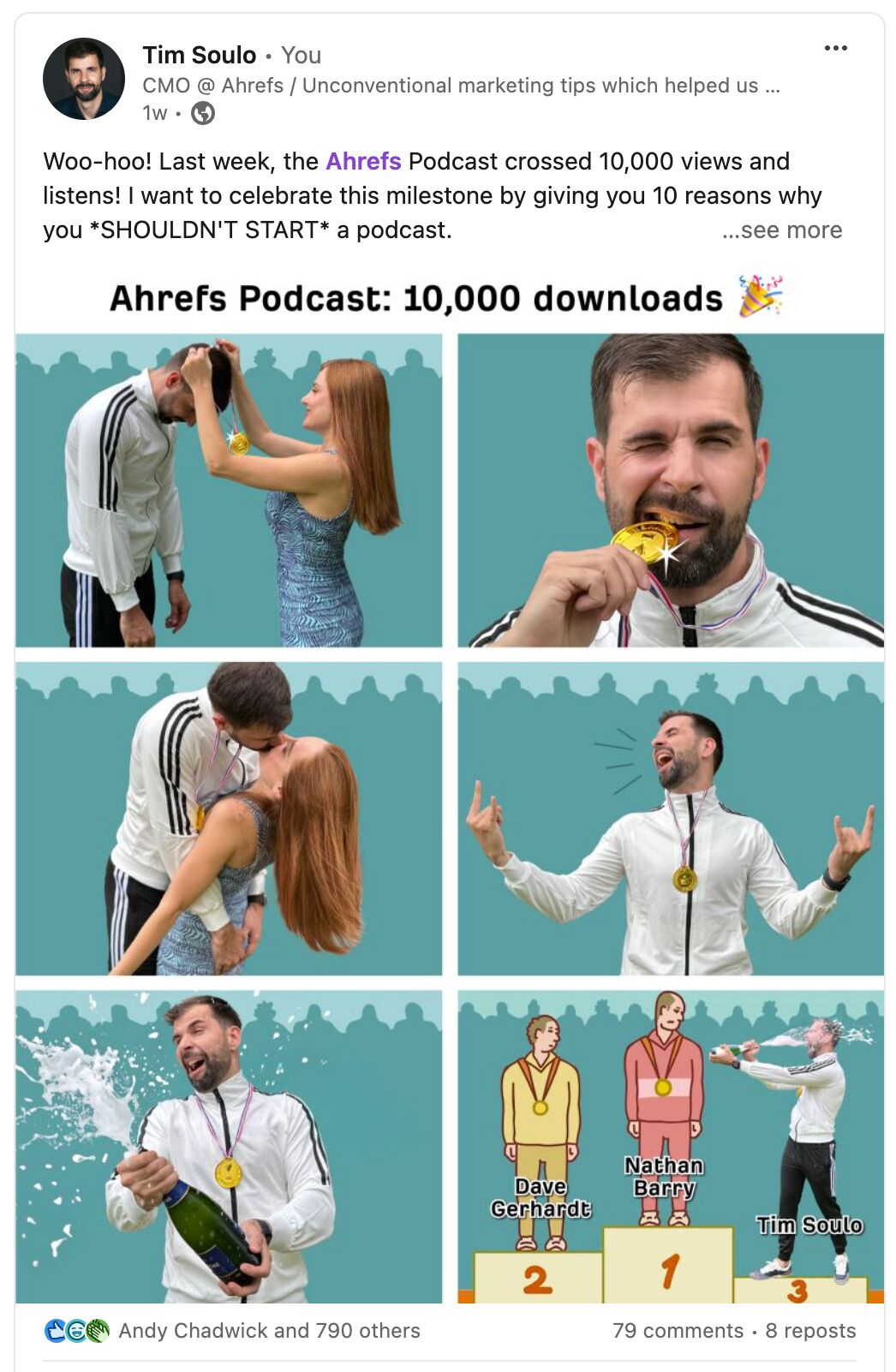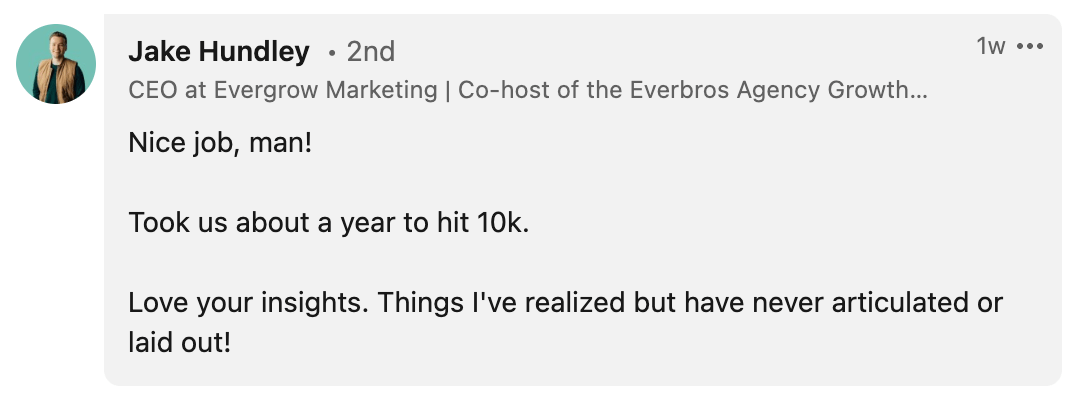Don’t Start a Podcast: 10 Lessons From 10K Downloads of Ahrefs Podcast
Everyone and their mom are publishing a podcast. Here are 10 reasons why you shouldn't
We’ve recently crossed 10k downloads for Ahrefs Podcast. And, to be honest with you, I thought this 10k would come easier.
I mean, Ahrefs is a fairly mature brand in the SEO industry, and most of our channels are measured in millions:
- Millions of visitors to this blog,
- Millions of views on our YouTube channel,
- Millions of visits to our free tools,
- Etc.
So when we reached that 10k milestone I felt both happy about it, and upset about the number being so low. It was kinda like the “3rd Place Celebration Meme” situation (which I thought would be very fitting to re-create for the occasion on LinkedIn):

My main takeaway: getting a podcast off the ground is very, very hard.
It doesn’t compound in the way SEO does and the format of “Zoom interviews” doesn’t perform very well on YouTube.
So if you were thinking of launching a podcast, I can give you 10 compelling reasons why you shouldn’t do it:
1. It’s a lot more work than you think.
I’ve noticed that too many people treat podcasts as “easy content”—get on a call, record, publish. Done!
Well… for us at Ahrefs, the actual interview is maybe 40% of work.
Inviting guests, scheduling time with them, doing decent research, creating an engaging introduction, designing a thumbnail for YouTube, transcribing, adding timecodes, writing titles and descriptions, uploading to a bunch of podcasting platforms, cutting out snippets for promotion, writing copy for those snippets…
Running a podcast is A LOT of work (if you want to create a quality show, of course).
2. You’ll need a team.
I can’t imagine doing Ahrefs Podcast alone. It’s a team effort from quite a few people:
- Michelle (our community manager) is doing most of the heavy lifting in terms of researching guests, editing the recording, and managing the whole process end-to-end.
- George and Nikita are the ones producing those cool intros.
- Sergey is designing thumbnails for YouTube.
- Helen is helping with uploads.
Yes, you can cut corners here and there. But you risk compromising the quality. And a low-quality show will make all your promotional efforts a lot less effective.
3. Interviewing is hard.
Before starting Ahrefs Podcast I did probably over a hundred interviews on other people’s podcasts. And I can tell you that being a host is much harder than being a guest. The pressure to make the interview interesting is entirely on you, not the guest.
The guest is mostly in a “reactive” mode—they just need to answer whatever is thrown at you. But the interviewer is the one ultimately responsible for the success of an interview. You have to stay sharp throughout, ask interesting questions, and know where to dig deeper (and when to change subject).
Too many podcast hosts like to cut corners here and just default to asking every guest the same set of generic questions, without trying dig a little deeper into the answers they get.
I love how Ryan Holiday described it:
“They’ll ask you a question, you’ll give an answer and then you can almost hear their eyes scan the paper they have in front of them as they move on the next question on the list.
It’s disrespectful to the guest, but that’s not my real problem with it. My problem is that it makes for really boring audio. Who wants to listen to someone literally phone something in? Why should you listen to a conversation that the host isn’t even listening to?”
- Ryan Holiday
4. One hour is not enough.
You might disagree with me on this one, because there are definitely some good short podcasts out there.
But when I tried interviewing my guests for one hour, I realized that it was not enough to squeeze some really good information out of them. Especially when your guest is very talkative and they like to digress—that can easily throw your entire interview plan off the rails.
But getting people to commit to speaking with you for two hours is a big ask. Many high profile people won’t bite unless your podcast is really well known.
And once you do get someone to spend two hours with you, staying sharp and alert for this long without a break can be quite challenging at times.
5. Piggybacking off your guests doesn’t work.
Some people think that landing a big name is all they need to get their podcast off the ground, and that will automatically guarantee views. No, it won’t.
If you search around on YouTube, you’ll find many podcasters who interviewed all the big names in the digital marketing space. And yet the views on these episodes are mostly in double digits.
But my biggest gripe is people who demand that their guests help them promote the interview. Once the episode is published, they follow up with a guest, asking them to “please share it with your audience.”
Sorry, but no.
I did five podcast interviews this month, and they were all nearly the same. And if I were to share each one of them on my social channels, I would only irritate my audience. And besides, most social networks don’t really like it when you post links, so the engagement and reach on these kinds of posts is super low.
If your only promotion strategy for the podcast is “my guests will help promote it”—I have bad news for you. They won’t.
6. You need credibility as an interviewer.
Take any “big” guest that’s on your mind and go search for their existing podcast interviews. They probably did a few dozen of them just this year. So why would anyone be interested in YOUR interview with that person?
There are only two reasons:
- You’re an interesting person yourself, so folks would listen to you even if it was a solo podcast.
- You’re very good at promoting (more on that later).
Looking at my own habits, 80% of podcast interviews I listen to are by hosts I already know and respect: Nathan Barry, Eric Siu, Dave Gerhardt, Kipp Bodnar & Kieran Flanagan, etc. Only 20% are by hosts I haven’t heard of before, but they promoted the episode well enough to get on my radar.
Podcasting is a pretty ineffective way to grow your own audience and popularity. But, on the contrary, it’s a pretty good way to leverage whatever existing audience and popularity you already have.
7. It’s a bad content format to sell your product.
I imagine your end goal is growing your business. That means you need to grow your sales. Which means you have to pursue the most high-converting marketing tactics available.
Well… a podcast is not one of them.
During my two-hour-long conversations with my guests, there’s actually very little opportunity to squeeze in some kind of Ahrefs sales pitch. I try to mention relevant use cases where it fits the conversation, but there were quite a few episodes where our product didn’t get any shoutout at all.
A podcast is a great tool for branding and building trust with your target audience. But I’m not expecting any sales to come from the episodes that we’ve published so far.
If you need sales, you’d be better off sponsoring some relevant podcasts in your niche (but even then, we tried it and didn’t see many sales from it). It’s a great way to raise awareness, but not make any immediate sales.
8. The focus is on your guest, not you.
Each episode should be focused on your guest and THEIR business. I mean… you didn’t invite some high-profile person on a call to just talk about yourself for a couple hours, right?
And besides, if you want the episode to land, you have to focus on making your guest look good. Your listeners are here to learn from your guest, and you have to make sure they’ll learn plenty.
In my own interviews, I try to dig really deep into my guests’ businesses and careers. I’m genuinely interested in what they do, why they do it, and how they do it. The entire conversation is all about them.
As a result, my guests have plenty of room to promote themselves and their business without feeling salesy. That’s one of the main reasons why they agree to be interviewed in the first place: they want to tap into my audience and promote their thing.
So if your goal is to promote your own thing—you need to be a podcast guest, not a podcast host.
9. It has a super short shelf-life.
Compare podcasts to SEO. An article you published 10 years ago can still bring you visitors (and sales) today. But as soon as you stop publishing new episodes of your podcast… everyone will forget about it.
10. It’s very hard to promote a podcast.
We just crossed a measly 10,000 downloads. It took us 3 months, 10 episodes, and a TON of promotion to get there. And Ahrefs already has a pretty big audience. If I were starting from a blank slate, I would have barely reached 1,000 downloads by now.
Why is it so hard to promote? Well, we basically discussed most of the reasons above:
- SEO doesn’t work for podcasts.
- “Zoom interviews” don’t fly on YouTube.
- Your guests are rarely keen to help you promote it.
- Podcasting platforms don’t have a good “discovery engine”.
In other words, without an existing audience to tap into, it’ll take you a lot longer than three months to reach 10k downloads.

So there’s that.
“But Tim… if podcasting is so troublesome, why are you doing it?”
Well… I didn’t say that podcasting was completely useless and totally not worth it. I merely shared 10 reasons why you should think twice before getting into it.
There’s obviously the other side of the coin. I’ll share my 10 reasons why YOU SHOULD start a podcast once we reach the 50k milestone. Stay tuned! 😉